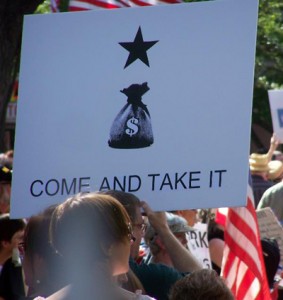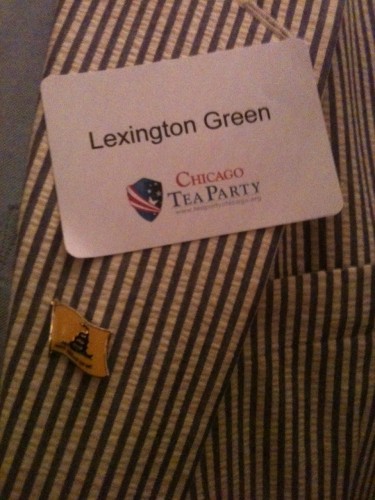Another night, another night of riots, arson and casual lootery, relatively untrammeled by the efforts of law enforcement, and perhaps slightly slowed down by the efforts of massed local residents and business owners. After three or four nights of this destruction, which leaves the internet plastered with pictures that look like the aftermath of the WWII Blitz, I would have hoped that the local residents were beginning to assemble and barricade their streets, rather than leave them open for the ‘hoodies’ to do their worst.
Conservatism
Tea for Texas
In the spring of 2009, I was asked by an old military blog-friend, a retired Air Force officer, if I would join his local Tea Party Committee to plan the Tax Day protest. We all assumed at that point that we would have an event involving five or six hundred people; with luck, we might even nab of bit of attention from our local media. We’d do it in a park someplace, listen to some speeches and hey, I was a former broadcaster, and he knew that I could write, and could I come along to write news releases? Pretty please? S’help me, that’s all that I thought it would be, and it would have been, save for a series of fortunate involvement by people who had bigger ideas and useful connections. So, our simple, humble home-made Tax Day 2009 Tea Party protest turned into a massive blow-out in Alamo Plaza, an all-day and into the evening extravaganza with Ted Nugent, at least 15,000 people from all over Texas and the United States, and Glenn Beck of whom at that point I had never heard. (Candidly, I had him mixed up with Jeff Beck and thought; oh, cool another conservative rock musician besides Ted Nugent.)
Chicago Tea Party Meeting Tonight
Chicago Tea Party meeting tonight, 7:00 p.m., features Otis McDonald, plaintiff in the critically important case gun rights case McDonald v. City of Chicago.
I hope to see some of you there. I will be wearing a seersucker suit and a Gadsden Flag lapel pin — carefully positioned to cover the small splotch from a drop of spilled coffee.
UPDATE: Despite Mr. McDonald being a last-minute no-show, this was about the best Tea Party meeting I have been to yet. I hope to blog about it soon.
Interesting Data
I’ve occasionally posted some thoughts on the ways in which people’s political beliefs are influenced by their professions, and we’ve also discussed this topic in Chicago Boyz discussion threads. Here is an interesting analysis of political contributions by various industries and interest groups.
Link via a commenter at this post (7/30, 10:45 am), who somehow derived from this data the conclusion that “Brain industries go with Dems. Muscle industries go with Repubs.”
Upcoming Chicago Tea Party Events
The Chicago Tea Party is sponsoring a TeaCon 2011 on September 30 – October 1, 2011. Check it out.
Before that, the next Chicago Tea Party meeting is on August 3, 2011. The speaker will be Otis McDonald, plaintiff in the critically important case of McDonald v. City of Chicago — which is worth reading, even if you are not a lawyer.
I plan to be at both of these events, hopefully wearing my new shirt:

